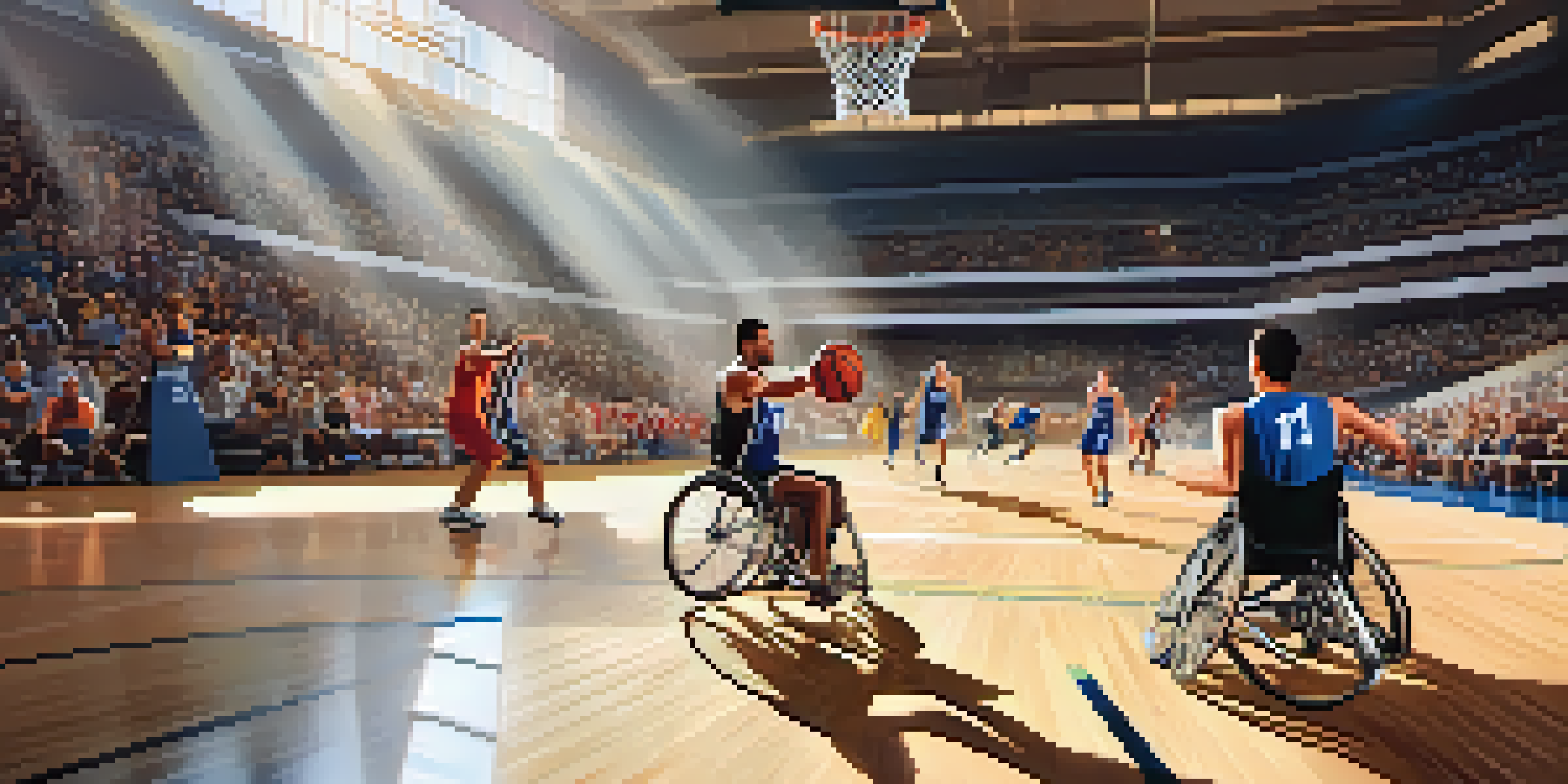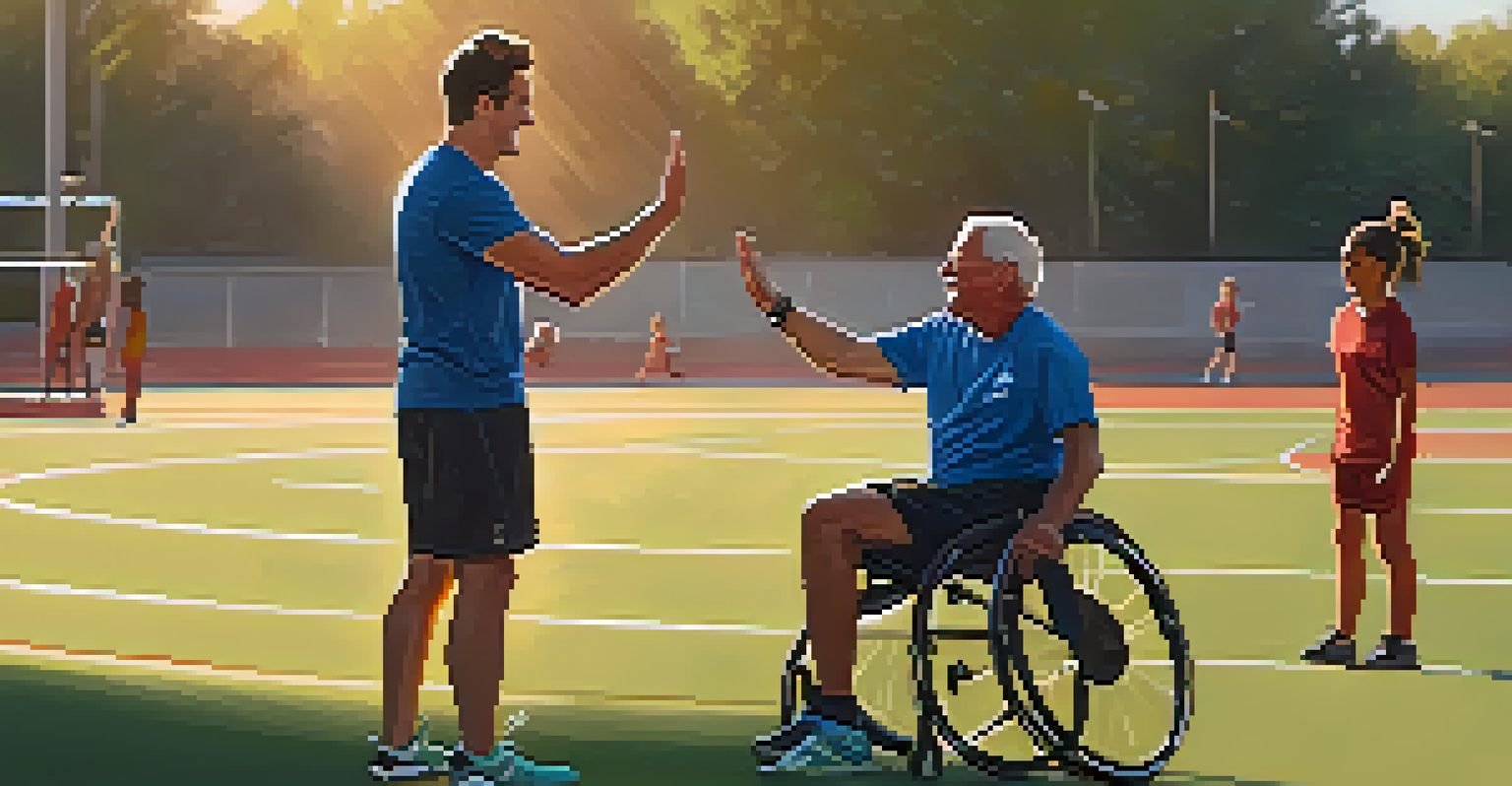The Benefits of Adaptive Sports Programs for Disabled Individuals

Understanding Adaptive Sports: An Overview
Adaptive sports are modified sports designed to meet the needs of individuals with disabilities. This inclusive approach allows people to participate in various physical activities, ranging from wheelchair basketball to adaptive skiing. By fostering a supportive environment, these programs promote both physical and social engagement, breaking down barriers that often hinder participation.
The only limit to our realization of tomorrow will be our doubts of today.
Unlike traditional sports, adaptive programs focus on the abilities of participants, rather than their limitations. This shift in perspective not only empowers athletes but also encourages them to explore their potential in ways they might not have thought possible. Adaptive sports help participants realize that their disabilities do not define them; rather, their determination and skill do.
Moreover, adaptive sports are not just for elite athletes; they cater to individuals of all skill levels. Whether someone is a seasoned competitor or a beginner, there’s a place for everyone in adaptive sports. This inclusivity is key to building a sense of community and belonging among participants.
Physical Health Benefits of Adaptive Sports
Engaging in adaptive sports can lead to significant improvements in physical health for individuals with disabilities. Regular physical activity helps maintain a healthy weight, strengthens muscles, and improves cardiovascular health. For many, the structured environment of adaptive sports provides the motivation needed to stay active.

Additionally, participating in sports can enhance motor skills and coordination. Many adaptive sports require fine-tuning of movements, which can translate into better daily functioning. This physical improvement often boosts confidence, making it easier for individuals to engage in other physical activities outside of sports.
Empowerment Through Adaptive Sports
Adaptive sports focus on abilities, empowering individuals with disabilities to realize their potential and build confidence.
Incorporating adaptive sports into one’s routine can also help reduce the risk of secondary health issues that often accompany disabilities. Conditions like obesity, heart disease, and diabetes can be mitigated through consistent physical activity, leading to a healthier, happier life.
Mental Health Advantages of Participation
The benefits of adaptive sports extend beyond physical health; they play a critical role in mental well-being. Participating in sports can reduce feelings of anxiety and depression, offering a sense of accomplishment and purpose. The thrill of competition and the joy of teamwork can be incredibly uplifting for participants.
Disability is not inability.
Moreover, the camaraderie developed through team sports fosters friendships that might not otherwise occur. These connections provide essential emotional support, helping individuals navigate the challenges of living with a disability. The shared experiences create a unique bond that encourages resilience and positivity.
Studies have shown that regular physical activity boosts the production of endorphins, the body's natural mood lifters. By engaging in adaptive sports, individuals can experience these mood-enhancing effects, contributing to an overall sense of happiness and fulfillment.
Building Social Connections Through Adaptive Sports
One of the most significant advantages of adaptive sports programs is their ability to foster social connections. Participants often form lasting friendships with teammates, coaches, and other athletes. These relationships can provide a vital support network that enhances the overall experience of participants.
Social interaction in adaptive sports can help combat feelings of isolation that many individuals with disabilities face. Engaging in team activities encourages communication and collaboration, skills that are essential in everyday life. The bonds formed in these environments often extend beyond the playing field, enriching participants’ personal lives.
Health Benefits of Participation
Engaging in adaptive sports leads to improved physical health, including better strength, coordination, and reduced risk of secondary health issues.
Additionally, adaptive sports events often draw in families and friends, creating a community atmosphere. This involvement not only supports the athletes but also educates others about the capabilities and achievements of individuals with disabilities, fostering a more inclusive society.
Promoting Inclusion and Accessibility
Adaptive sports programs play a vital role in promoting inclusion for individuals with disabilities. By providing opportunities for participation, these programs challenge societal perceptions about disability and ability. They demonstrate that everyone deserves the chance to engage in sports, regardless of their challenges.
Inclusion in sports translates into a broader acceptance in society. As more people witness the capabilities of adaptive athletes, stereotypes and misconceptions begin to diminish. This shift not only benefits athletes but also inspires communities to create more accessible environments for everyone.
Moreover, adaptive sports programs advocate for improved facilities and resources. As demand for inclusivity grows, communities are encouraged to invest in accessible sports infrastructure, which ultimately benefits all individuals, disabled or not.
The Role of Volunteers and Coaches in Adaptive Sports
Volunteers and coaches are the backbone of adaptive sports programs. Their commitment and passion create an environment where athletes can thrive. These dedicated individuals often undergo specific training to understand the unique needs of their athletes, ensuring a safe and supportive experience.
Coaches play a pivotal role in developing athletes’ skills and confidence. They tailor training regimens to fit individual abilities, fostering a sense of progression and achievement. The encouragement and guidance offered by coaches can be life-changing, inspiring athletes to push their boundaries.
Building Community Connections
Adaptive sports foster social connections and a sense of belonging, combating isolation and enhancing emotional support among participants.
Volunteers also contribute significantly by helping organize events, raise funds, and provide transportation. Their involvement promotes a sense of community and highlights the importance of collective effort in making adaptive sports successful. Together, they create an atmosphere where everyone feels valued and empowered.
Success Stories: Inspiring Examples of Adaptive Athletes
Across the globe, countless adaptive athletes have proven that determination knows no bounds. Stories of triumph in the face of adversity, such as those who have competed in the Paralympics, inspire many. These athletes showcase the incredible possibilities that arise when individuals are given the opportunity to pursue their passions in sports.
One notable example is a former wheelchair basketball player who went on to become a motivational speaker, sharing his journey and encouraging others to pursue their dreams. His story emphasizes the impact that adaptive sports can have not only on individual lives but also on the community. Such success stories ignite hope and ambition in others facing similar challenges.

These athletes serve as role models, demonstrating that with the right resources and support, anything is achievable. Their success highlights the importance of adaptive sports programs in fostering talent and encouraging individuals to reach their full potential.